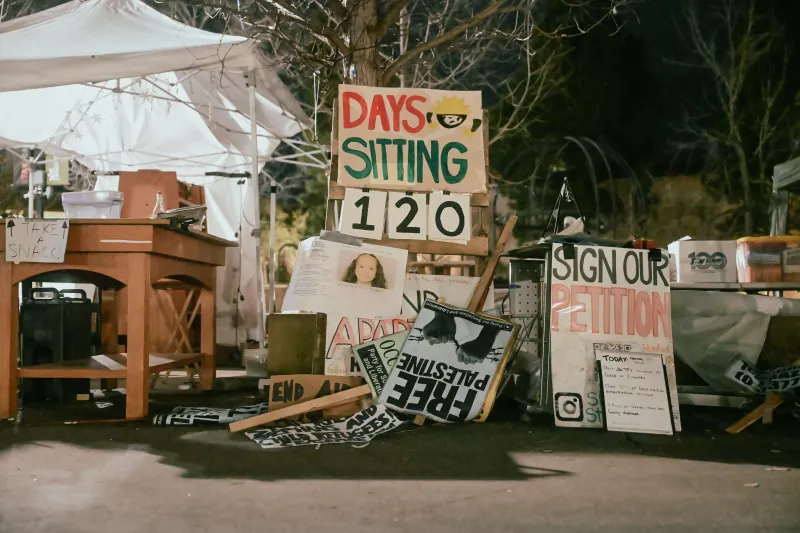The University removed the physical structures that comprised the pro-Palestine Sit-in to Stop Genocide early Saturday morning, while no participants or organizers were present at the sit-in. This removal, carried out by UG2 service workers and Stanford University Department of Public Safety (SUDPS) officers, followed a week-long reprieve period.
Amid the reprieve, University administrators met with sit-in organizers for two negotiation sessions. The University agreed to four commitments demanded by the sit-in.
Sit-in participants agreed to dismantle tents and other physical structures before 8 p.m. on Friday, per agreements with the University to cease overnight camping following the two negotiation sessions.
Due to a reported shooting threat on Friday afternoon, sit-in members requested that the University allow them to collect belongings and dismantle tents Saturday morning. The University reaffirmed the 8 p.m. removal deadline, according to email correspondence obtained by The Daily.
According to sit-in members, University administrators agreed on a phone call that workers would not be sent until late Saturday morning or afternoon.
Between 4 a.m. and 6 a.m. on Saturday, service workers took down tents and removed the sit-in’s belongings. Several sit-in participants criticized the decision to remove belongings while students were away.
“The sit-in has become something really large, something really important to a lot of people’s lives, so for it to be taken down so unceremoniously, with several very serious miscommunications, was really sad,” said sit-in participant Tobi Bankole ’24.
The Sit-in to Stop Genocide raised five demands to the University: divesting from and boycotting entities and companies “complicit in Israeli war crimes, apartheid, and genocide,” calling for a ceasefire in a University statement, providing resources to Palestinian diaspora, Arab and Muslim students, identifying and addressing educational biases against Palestinian and Arab issues and creating five student seats on the Special Committee on Investment Responsibility.
Following a Nov. 13 announcement that two new university committees would provide recommendations on ways to raise awareness about and mitigate Islamophobia and antisemitism on campus, the sit-in advocated for divestment and other ways for the University to support Palestinian thought and representation. According to organizers, this included an Arab Studies track within the Comparative Studies in Race and Ethnicity program.
Following two negotiation meetings on Feb. 14 and 16, sit-in organizers told The Daily that President Richard Saller and Provost Jenny Martinez agreed to “deliberate about coordinating with Palestinian students to release a statement about their experiences over the past four months.”
According to organizers, Saller agreed to raise concerns around investments to the Board of Trustees, specifically investment transparency, divestment from weapons manufacturers and military contractors and student representation on the Special Committee on Investment Responsibility.
Sit-in organizers expressed reserved optimism in a statement to The Daily: “While these commitments are a far cry from what is necessary for Stanford to address its institutional complicity in Israel’s crimes of apartheid and genocide, they nevertheless represent another step forward,” they wrote.
Some organizers criticized that demands were not addressed until the sit-in demonstrated. Alisha Service ’26 wrote that administrators were only willing to make commitments on demands tied to support for students. Some examples included accommodations for Palestinian students and a committee focused on discrimination against Palestinian, Arab and Muslim students, Service wrote.
“Those are not difficult demands. They should have existed prior to Oct. 20, when we started our protest,” Service wrote.
Sit-in organizers questioned the decision to remove belongings early Saturday morning, especially as participants’ belongings are now held by SUDPS.
The University wrote that students could reclaim property “during normal business hours next week,” in a Feb. 17 update.
Sit-in participants plan to continue demonstrations within the 8 a.m. to 8 p.m. time approved by the University. On Saturday night, the sit-in held a vigil to support Palestine, which was planned before tents were removed.
While it was sad to see the tents removed, participants said they were committed to the sit-in’s cause: “At the heart of it is the people who we are here for, who we are standing for at the end of the day — Palestinians on campus, in Gaza, and all around the world,” Bankole said.
